| Reviews & Columns |
|
Reviews DVD TV on DVD Blu-ray 4K UHD International DVDs In Theaters Reviews by Studio Video Games Features Collector Series DVDs Easter Egg Database Interviews DVD Talk Radio Feature Articles Columns Anime Talk DVD Savant Horror DVDs The M.O.D. Squad Art House HD Talk Silent DVD
|
DVD Talk Forum |
|
|
| Resources |
|
DVD Price Search Customer Service #'s RCE Info Links |
|
Columns
|
|
|
Marcus Welby, M.D.: Season One
"How would you know what she needed? Except what you learned in text books and therapy manuals. She was just a 'case' to you. A chance to display your skills. I admit you have those skills. Now you have to learn medicine goes beyond technique and into human need. When you begin to search for that need as carefully as you search for the causes of illness, the cures...then you'll be practicing medicine."
"I don't need to justify myself."
"I can think of a couple of patients I'd like to slap."
"The longer I practice, Steve, the more I question the wisdom of exercising too much power over a patient's life. The danger is too great."
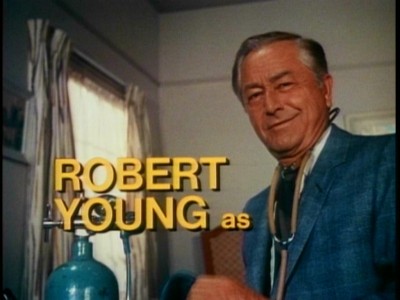
My granny's favorite show...Robert Young was a god to her. Shout! Factory (love 'em) has released Marcus Welby, M.D.: Season One, the ABC smash-hit medical drama that debuted in 1969, starring Father Knows Best's icon Robert Young, young stud James Brolin, and Elena Verdugo. I don't know how much resonance the show has today (I don't remember its syndication lifespan being too long), but if you were around during its prime-time run, you'll remember the reach this well-written, thoughtful show had within the American pop culture (the character's name, "Marcus Welby," became synonymous with "doctor"...it probably still is for many viewers from my generation). No extras here, and the transfers are less-than-stellar (acceptable, though), but this successful hybrid of old-timey, conventional medico thriller and edgy, "New Television" 70s drama, is irresistible to vintage TV fans.
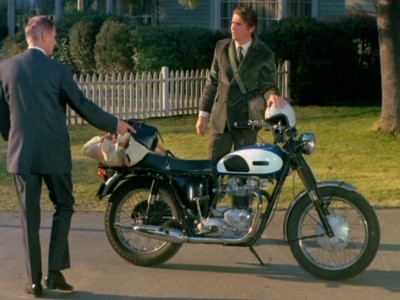
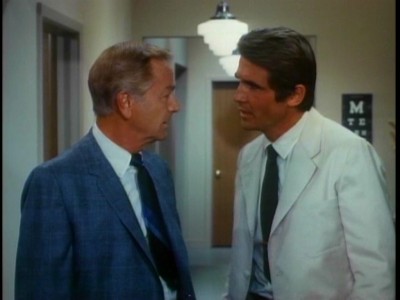
Beautiful Santa Monica, California, circa 1969. Suburban G.P. (that's "General Practioner" to most of you who have grown up with "specialists" all your life) Dr. Marcus Welby (Robert Young), has suffered a mild myocardial infarction, due to his harried, stressful workload. Arguing with friend and hospital director Lew Ayres (a one-time shot for Ayres in the two-hour pilot that sets up Marcus Welby, M.D.), Marc doesn't want to quit his private practice and take a less-stressful job as a teacher at the hospital; he wants to stay with his patients. He wants to remain active and truly needed as a healer, so he eventually accepts the suggestion that he take on a partner in his practice. And so enters young, brash, arrogant Dr. Steven Kiley (James Brolin), a promising neurosurgery resident who wants nothing to do with a "horse and buggy" G.P. career. Surprisingly, money wins out for Kiley (he needs it), so he agrees to a temporary one-year deal with Welby's practice, and so begins the constant battle between the two physicians: one hot-tempered, unconventional, unorthodox in his approach to medicine, willing to break the ethical rules to save a patient's life, and the other one calm, cool, collected, with a far more conventional, by-the-book approach to healing the sick of body.
SPOILERS ALERT!
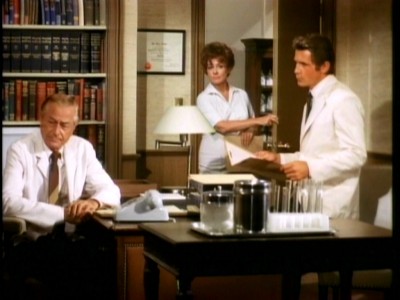
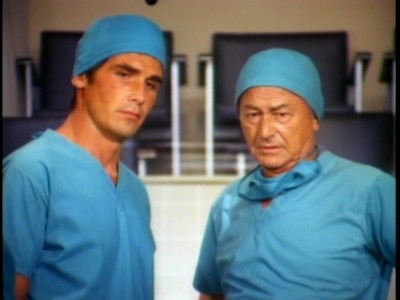
You think you've got that last one figured out, don't you? Brolin's the hothead, right? And Young's the calm, cool, collected one? Diagnosis: wrong-o! They're reversed. And that was Marcus Welby, M.D.'s hook that helped grab viewers back in 1969. Robert Young, the stereotypical picture of the kindly, smooth physician with the silver-tinged hair (when they get the dye job right; it's a toss-up week to week) and the confident air is the unconventional one, while Brolin, with his young, maverick looks and hotshot cool moves (he rides a sweet Triumph...but lose that goofy Love Bug helmet, doc) is the stick-in-the-mud when it comes to treating "the whole person." It's a potent switcheroo that played games with viewers' expectations fed by years of other similar medical show set-ups (Dr. Kildare, Ben Casey), expectations that were particularly strong back in 1969 when pop culture was undergoing an upheaval towards youth-oriented viewpoints while denigrating anything "Establishment," or worse...old. A lot of writers who discuss movies from that period focus on watershed breakthroughs in youth-focused hits such as 1967's Bonnie and Clyde and 1969's Easy Rider, discussing their political and sociological ramifications on the pop culture. But many of those writers conveniently forget that there was an immediate "backlash," if you will (a benign one, admittedly), against that push towards youth-over-experience content, with "old-fashioned" entertainments like Airport and Love Story breaking box office records the very next year in 1970. "Geriatrics" were primed to come back with a vengeance (and by "geriatrics," I mean anyone over 35 to the new, young TV and movie studio execs hired-in by panicky board members who wanted to ride the youth gravy train); those "oldsters" had had it with these young punks pissing all over their traditions, their conventions, the world they made - and most importantly, their movies and TV shows.
So it must have been somewhat titillating, somewhat "naughty" for those viewers to tune into Marcus Welby, M.D., expecting 62-year-old Robert Young to hold the conventional line against tradition-breaking youngster James Brolin...only to discover the show's implied expectations were inverted. Now, the show makes no bones about painting Marcus as a well-meaning liberal (hey, that's the show's word, not mine - so don't email); this after all was the time when network television was finally coming out of the closet to embrace the "New Television" with series that were underscored by then-current political and sociological hot-button issues (ABC had earlier scored a pop culture hit with their cop show/hippie hybrid, The Mod Squad). But of course, Marc's form of liberalism has almost nothing to do with today's brand of goof-ball lefty socialist gar-bagé (I would imagine most hard-core liberals today would be shocked at Marcus' beliefs, particularly about such issues as abortion, adoption and single mothers - as well as his (welcome) paternalistic attitude, which must send libbers today right round the bend). And truth be told, he's not that much of a rebel; he actually listens when his ideas and actions are challenged by Dr. Kiley. Unlike the flotsam that nobody watches on the network airwaves today, Marcus Welby, M.D. is quite fair and balanced (you decide) with its politics, showing the courage of its liberal convictions by making sure Marc's views are questioned, with no easy answers ultimately provided (something you never see today in network TV programming that is deliberately fascist in its promotion of one political ideology: the Left).
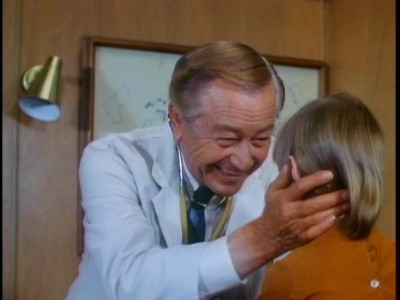
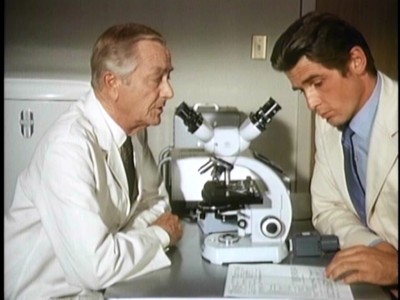
A good example of this is Let Ernest Come Over, written by Lionel E. Siegel, where Marc goes to extreme measures to help a black police officer (Percy Rodriguez) make detective before he has to reveal he has hypoglycemia and retire from the force. Kiley admits to being initially suspicious of the at-first suspicious-acting officer solely because he's black, and Marc openly pleads for the officer's promotion specifically as a morale booster to the black community. But Marc's brand of "guilty white liberalism" is called out by the detective and by Kiley, who asks Marc if he would have worked as hard for the officer if he had been white - a question that obviously disturbs Welby who hopes he would have (even though we suspect he knows he wouldn't). In The Soft Phrase of Peace, a non-violent black activist's (Melvin Stuart) son is beaten by a young, white police officer during a college protest, but Marc's medical investigation seems to support the officer's account: self-defense. A brain tumor is found (temporal lobe epilepsy), and the officer's version of events is confirmed. Complicating matters, the son lies about police brutality to investigators at the instigation of the father's radical lieutenant, Robert Guillaume, who screams about "any means necessary, it's the ends we're after"(funny how that particular ideology is popular again in the last two years...), but once the truth is known, the father does indirectly support the police officer...even though Marc isn't made to apologize for his frankly disgusting behavior towards the officer (this liberal show may be fair most of the time, even airing the grievances of the young cop who says he's not a "pig" and doesn't support civil unrest...but it's not going to go crazy and make Marc actually apologize to a cop in 1969).
No, what I suspect will be rather shocking for today's viewers (particularly those younger ones who don't remember what doctors used to be like), is Marcus' behavior towards his patients. When I was a boy, I went to a G.P. on my small town's main street, where his combination office/home wasn't all that dissimilar to Welby's in the series. I knew that doctor my whole life, growing up. Today, I rarely even see a real doctor for all the anonymous, glorified nurses and "physician assistants" who treat me (the last time I had a sore throat, an assistant told me what was wrong...as she read the diagnosis to me from a paperback book she was fumbling through...). And let me tell you, that old doctor knew me. He knew my family, he knew what was up with people in the town. He knew the score. And he did actually talk to me (and to other patients) like a friend - because he was one. Now, the hyper-involved G.P. of Marcus Welby, M.D. is of course a little too good to be believed; I don't know if anyone would want the kind of personal involvement in their lives that Marcus believes is necessary to successfully treat a patient (in one episode, he drives sixty miles out of town, uninvited, just to try and convince a patient of his methods). This is, after all, television: the single biggest fake-out ever perpetrated on man (and thank god for that deception, too). But there did use to be a bond that formed between G.P.s and long-term patients, and you listened to that friend because he or she knew you for years and years (don't worry, with medical martial law coming soon to America thanks to Obamacare, what few G.P.s remain will eventually be driven out of their profession; the American Academy of General Practice, which endorsed Marcus Welby, M.D. prominently with their logo during each end credit, doesn't even exist anymore).
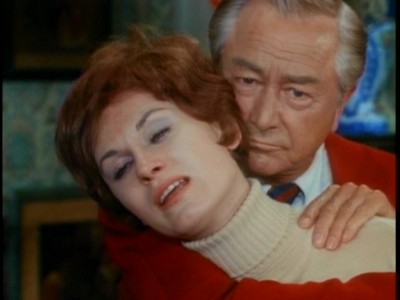
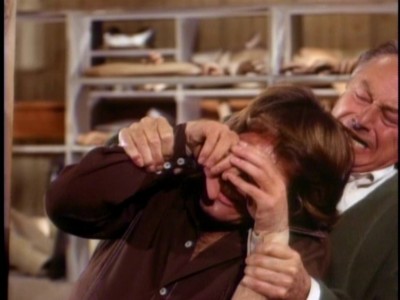
And that all sounds cozy, doesn't it (and very probably romanticized, if I'm honest), but when watching Marcus Welby, M.D., "cozy" isn't exactly the word that comes to mind, if you can get past the inherent nostalgia that a 40-year-plus TV show conjures up. Because for a healer, Marcus Welby sure throws around a lot of threats, boy. Father Knows Best, Robert Young's previous TV outing (not counting his interesting failure, Window On Main Street), made him a cultural touchstone for many viewers who remembered the 1950s with an idealized glow, so one would assume his Marcus Welby character would similarly be avuncular and genial and laid-back like Jim Anderson. Not so. By comparison, Marcus Welby is raging, shouting orders at his patients with an aggressive self-assurance in their well-being that's startling when you synch him up with the lawsuit-paralyzed physicians of today. You don't know what decision to make about your body? Marc does, and he's going to tell you, in no uncertain terms (in Diagnosis: Fear, he tells a young basketball player reluctant to have surgery, that his body is Marc's, too: he delivered it, and he cared for it all these years, and his opinion counts, too). And if you don't do what he says about your body, if you don't do what's best for your health...well, he's gonna let somebody know about your foolish decision. Like your wife. Or your boss. Or even the cops and the courts. Let's not even get into the myriad number of ethical boundaries Marc either skirts or outright destroys (nor the seemingly outdated medical techniques - do they still smack around autistic kids today?): he knows best (Doctor Knows Best), and you had better listen, buddy boy, or else (he might even wrestle around with you a bit, if you're freaking out on acid, or shove you down in a chair if he doesn't want you to leave his office (!), or hold and stroke you if you're dying of cancer). This sometimes self-righteous attitude of course will drive everyone absolutely crazy today watching Marcus Welby, M.D. (he even recognizes it in himself at times), but in this age of consummate amelioration, where no one is allowed to have an opinion, where no one is truly an expert to be trusted or believed, Marcus' supreme belief in his own abilities (with a modicum of self-doubt and questioning - along with Kiley's constant needling about Marc's sainthood - thrown in for flavoring) is rather...bracing, in these pusillanimous, cowardly times.
Tuesday night viewers back in the fall of 1969, faced with the prospect of watching either Marcus Welby, M.D. on ABC, or some crappy documentary on CBS (CBS News Hour) or a movie repeat over on NBC, decided they liked Robert Young emotionally abusing his patients (I'm kidding; he's firm, but really rather sweet with them), and made Marcus Welby, M.D. an immediate sensation. Having zero direct competition over on the other networks, and having a strong line-up at the 8 and 9pm time slots (rising The Mod Squad hit 23rd for the year, while soon-to-be iconic ABC Movie of the Week reached 22nd), Marcus Welby, M.D. shot right up into the Nielsen Top Ten with an 8th place finish for the year - a startling performance for an ABC series since the network still didn't have the station coverage to match either NBC or CBS (as illustration, ABC had only 6 series in the Nielsen Top Thirty in 1969). Interest in Dr. Welby's adventures in total medical and personal commitment to a patient's well-being didn't abate after this premiere season; next year, Marcus Welby, M.D. would be the first ABC series ever to reach that coveted number one television series for the entire season (you'd think ABC would have a wing or a commissary named after Welby for that feat alone). Let's hope Shout! releases that second season right smartly.
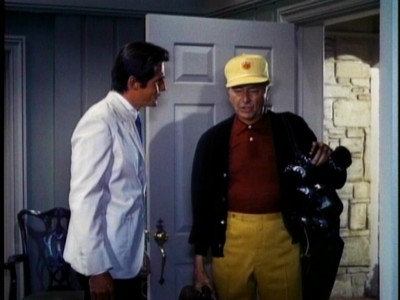
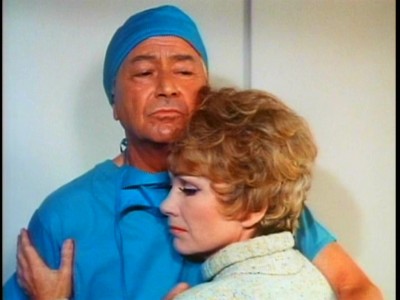
Here are the 26 episodes from the seven-disc collection, Marcus Welby, M.D.: Season One, as described on the enclosed episode guide pamphlet:
DISC 1
A Matter of Humanities (Pilot) (3/26/1969)
Dr. Marcus Welby enlists the help of a young Dr. Steven Kiley to help run his Santa Monica practice.
Hello, Goodbye, Hello (9/23/1969)
An outgoing schoolteacher with only a few months left to live goes into seclusion, and Dr. Kiley attempts to get her to live the life she has left.
The Foal (9/30/1969)
Dr. Welby attempts to help a withdrawn autistic child communicate despite pressure from the child's parents and an unfeeling psychologist.
DISC 2
Don't Ignore the Miracles (10/7/1969)
A 42-year-old woman wants an illegal abortion after learning that her husband is having an affair 19 years into a happy, but childless, marriage.
Silken Threads and Silver Hooks (10/14/1969)
Dr. Welby attempts to discourage a husband from filming a documentary on his actress-wife's recovery from a stroke.
All Flags Flying (10/21/1969)
The doctors struggle to discourage an aging war hero from sailing alone to the South Pacific, as the voyage could prove fatal.
Echo Of a Baby's Laugh (10/28/1969)
Dr. Welby examines a young wife in her third trimester and discovers a condition in her blood that could spell trouble for the baby and reveal a long-kept secret to her husband.
DISC 3
The White Cane (11/4/1969)
A blind couple's relationship is tested when an operation restores the young man's sight and they have to reconcile their worlds.
The Vrahnas Demon (11/11/1969)
An aging yet robust diver refuses to take Dr. Welby's advice to slow down after he's informed that he has emphysema.
Madonna With Knapsack and Flute (11/18/1969)
Myra takes a pregnant hippie whom Dr. Welby is treating for mononucleosis into her home and develops an emotional attachment despite Welby's warning not to.
Homecoming (11/25/1969)
Dr. Welby and Dr. Kiley disagree on the treatment needed for a recovering drug addict who suffers from the aftereffects of LSD.
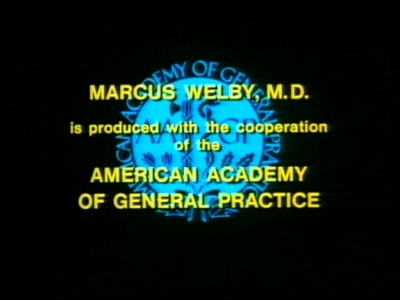
DISC 4
Let Ernest Come Over (12/9/1969)
A policeman who is up for a promotion wishes to keep his illness quiet, but Dr. Welby is unwilling to keep the ailment secret because it may hinder the officer in completing his duties.
The Chemistry Of Hope (12/16/1969)
Parents of a teenaged boy with leukemia refuse to allow Dr. Welby to inform him of his condition.
Neither Punch Nor Judy (12/23/1969)
A priest friend of Dr. Welby's suffers severe asthmatic attacks due to pressure from his parishioners. The pressure increases when he is unable to restore an injured man's will to live.
Diagnosis: Fear (12/30/1969)
A basketball player seeks out a faith healer for his injured knee instead of having the surgery Dr. Welby recommends.
DISC 5
The Soft Phrase of Peace (1/6/1970)
Dr. Welby treats the son of a black leader who is injured by police during a demonstration.
Fun and Games And Michael Ambrose (1/213/1970)
A diabetic threatens to stop taking his insulin shots to get even with his father, whom he blames for his mother's suffering.
The Legacy (1/27/1970)
Consuelo's mother is diagnosed with a malignant tumor, and although she accepts the doctor's diagnosis, she finds it hard to accept her roommate, a sour woman dealing with a heart condition.
Dance To No Music (2/3/1970)
Doctors Welby and Kiley conduct tests to determine if a scientist has Huntington's, a hereditary disease he's convinced he's afflicted with. His condition worsens upon learning that his wife is pregnant.
DISC 6
Go Get 'Em, Tiger (2/10/1970)
Dr. Kiley has to choose between his duty as a doctor and an old friendship when he's called on to give a friend, a reformed drug addict, a physical exam to fulfill a job requirement.
Nobody Wants a Fat Jockey (2/17/1970)
Despite suffering fainting spells, a young jockey does everything he can to lose weight for the most important race of his life, and in doing so he collapses and is hospitalized.
The Other Side Of The Chart (2/24/1970)
When Dr. Kiley is hospitalized for chicken pox, he becomes interested in an exploratory surgery case and attempts to convince the doctor to try alternative testing.
The Merely Syndrome (3/3/1970)
Though she underwent a successful heart surgery as a young girl, a newlywed suffers heart seizures as an adult. Wanting a full life, she pushes the limits despite an overprotective husband.
DISC 7
Sea of Security (3/10/1970)
A student with decompression syndrome insists on one more dive for his degree in Oceanography despite Dr. Welby's advice.
The Daredevil Gesture (3/17/1970)
A hemophiliac begs Dr. Welby to keep his condition secret from his new schoolmates. Dr. Welby is concerned that he risks his health to achieve a normal teenage existence.
Enid (3/24/1970)
Dr. Kiley rescues a young boy with asthma and meets Enid Cooper, a compassionate counselor at an orphanage whose medicine cabinet suggests a dependence on prescription drugs.
The Rebel Doctor (4/14/1970)
Dr. Welby steps in to help a former classmate of Dr. Kiley's, a maverick young doctor who is fighting to keep his neighborhood clinic operational.
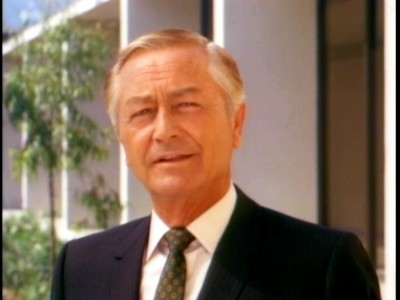
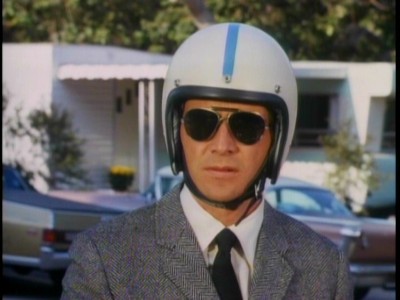
The DVDs
The Video
The full-screen, 1.33:1 (yes, that's the correct ratio, Mr. Kehr) transfers for Marcus Welby, M.D.: Season One are acceptable, but certainly not in a league with say a Paramount vintage TV release. Colors are muted (I remember those titles as being bright yellow), while the picture is often soft and somewhat fuzzy. Grain is apparent from time to time, along with expected screen anomalies, such as scratches and dirt. It's an...okay picture, but that's all (and ABC's house style back then was a knock-out, so this doesn't come close to that original feature film-like, eye-popping look).
The Audio
The Dolby Digital English 1.0 mono audio track varies quite a bit from episode to episode (and scene to scene, frankly), with hiss noticeable at times, as well as fluctuating recording levels and an overall muddy tone. A bit of a disappointment not to hear that beautiful, mellow Leonard Rosenman theme in a stronger presentation. No subtitles or close-captions, either.
The Extras
No extras, other than the episode guide (which is nicely designed, compared to other ones I've seen: good color pictures and a fun layout).
Final Thoughts
I don't know if grandmothers are the same anymore (they certainly don't look like the ones from my childhood, in their J.C. Penny's house coats and beauty parlor hair-dos), but my granny's favorite conversational gambit was "Guess My Ailment," and Marcus Welby, M.D. was her dream show ("You want to watch what? Sixty Minutes? Which one are you, anyway? Paul? Get the hell away from my set!"). It reassured her fears about getting older or getting sick (Marcus was always so positive, so sure), while giving her a geriatric sex symbol she could dream about inbetween the Geritol
|
| Popular Reviews |
| Sponsored Links |
|
|
| Sponsored Links |
|
|
| Release List | Reviews | Shop | Newsletter | Forum | DVD Giveaways | Blu-Ray | Advertise |
|
Copyright 2024 DVDTalk.com All Rights Reserved. Legal Info, Privacy Policy, Terms of Use,
Manage Preferences,
Your Privacy Choices | |||||||














